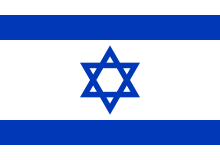The Zionist regime

The Zionist regime is a political term that some opponents use instead of the Israeli government. In the political literature of the Islamic Republic of Iran, this title and similar titles such as the occupation regime of Quds are used to name Israeli government.[1] Hamas and Lebanon's Hezbollah groups also use this term in their literature to refer to the Israeli government. They also use the term Zionists and occupiers for non-Palestinian citizens of Israel, especially its government and military forces.[2]
Some researchers consider the existential philosophy of the formation of the state of Israel to be derived from the theory of Zionism, and therefore they call the ruling regime of that country the Zionist regime.[3][citation needed]
Opponents of Israel call the entire country of Israel and those parts of the Palestinian land occupied by Israel, occupied Palestine.[4]
The occupying regime of Jerusalem
[edit]The occupation regime of Jerusalem (Quds) is another term that the Islamic Republic of Iran's government officially applies to the Israeli government.[1] Hamas and Lebanon's Hezbollah groups also use this word in their literature to refer to the country of Israel.[2]
History
[edit]The use of this political term for the first time is often attributed to Ruhollah Khomeini.[5][6] The Islamic Republic of Iran does not recognize the state and country of Israel.[7]
On the one hand, the Iranian politicians' use of words such as "Zionist regime" or "occupying Quds regime" definitely refers to the country of Israel, not its current ruling system. On the other hand, their goal is to "avoid giving status to the state of Israel by not recognizing the name of Israel".[8]
Other uses of the Zionist regime
[edit]During the Iran-Iraq war, each side was condemned other side for its dependence and relationship with Israel, and of course, both countries claimed to be hostile to Israel, so in Iran and in political terms, the term "Baathist-Zionist regime" is sometimes used to refer to Saddam's regime. Saddam Hussein's government and Iraqi diplomats, their mass media, and their government sources used the term "Zionist system" to refer to the government of the Islamic Republic of Iran, so that the term "Zion-Khomeinism" (Arabic: صهیوخمینیة) was widely used in the political literature of Iraq.[9]
See also
[edit]- Iran–Israel relations
- Fathi Razem
- History of the Jews in Iran
- Iran–Israel proxy conflict
- Iranian Jews in Israel
- Israel–Saudi Arabia relations
- Persian Jews
- Tehran – Haifa – Tel Aviv
- Visa policy of Iran about Israel
- Ahmad Qasir
- Jeremy Loffredo
References
[edit]- ^ a b According to Kamal Kharazi: "In our opinion, Israel is not a legitimate state; And in our opinion, it is not a country. Israel has occupied the lands of the people of that region and therefore it should be known as the occupying regime." From:
Iran in Crisis?: Nuclear Ambitions and the American Response. Roger Howard. Zed Books. 2004. p.48 ISBN 1-84277-475-1 - ^ a b "حزبالله لبنان همچنان در اوج موشکباران اسرائیل لحظهای قطع نمیشود" [Lebanon's Hezbollah continues to be at the height of Israel's rocket attacks] (in Persian). Retrieved 12 October 2024.
- ^ لیلیانتال, آلفرد م. ارتباط صهیونیستی، ترجمهٔ سید ابوالقاسم حسینی (in Persian). مرکز نشر آثار پژوهشگاه فرهنگ و اندیشه اسلامی، شابک ۹۶۴-۶۶۱۰-۵۳-۶.
- ^ "اشغال فلسطین" [Occupation of Palestine] (in Persian). Retrieved 12 October 2024.
- ^ The United States and Iran: Sanctions, Wars and the Policy of Dual Containment. Sasan Fayazmanesh. Routledge. 2008. ISBN 0-415-77396-2 pp.174
- ^ Surrender Is Not an Option: Defending America at the United Nations and Abroad. John Bolton. Simon and Schuster, 2007 ISBN 1-4165-5284-7 pp.314
- ^ بهبودیخواه, ا.ا. "نقد توجیهات تاریخی صهیونیسم در مورد مشروعیت رژیم قدس". سیاست خارجی. ۳/۲. ژوئن-اوت ۱۹۸۹. ص۳۱۴–۳۴۴ (in Persian).
- ^ «...when Iranian leaders use the euphemism “Zionist regime” or “the Jerusalem-occupying regime,” they are most definitely referring to the State of Israel and not to the present regime. Iranian leaders are simply following the time-worn practice in the Arab world of referring to the “Zionist regime” in an attempt to avoid dignifying Israel by recognizing its name.»
What Iranian Leaders Really Say About Doing Away with Israel. J. Teitelbaum. JCPA. 2008. : 9652180653 pp.7 (Stanford University Edition) - ^ Language as a medium of legal norms: implications of the use of Arabic as a language in the United Nations system. Volume 131 of Schriften zum Völkerrecht. Lutz Edzard. Duncker & Humblot, 1998. ISBN 3-428-09307-0 pp.81
